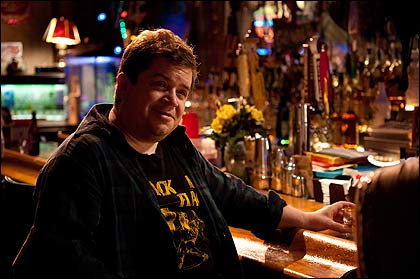
Arrested Development
Growing up is a bitch in Young Adult
YOUNG ADULT: Directed by Jason Reitman. Written by Diablo Cody. Cinematography, Eric Steelberg. Editor, Dana E. Glauberman. Music, Rolfe Kent. Starring Charlize Theron, Patton Oswalt, Patrick Wilson and Elizabeth Reaser. Paramount Pictures, 2001. R. 94 minutes. Four stars.
 |
Mavis Gary (Charlize Theron) has her head, as the saying goes, so far up her ass she thinks she’s the only one breathing fresh air. A successful writer whose name hardly appears on the books she pens (she ghostwrites a teen series currently on the popularity downswing), Mavis has more in common with her self-centered, preening characters than with the ostensibly functioning adults who are her peers. Despite being clearly unhappy, Mavis hasn’t gotten it through her head that other people can be happy while making choices she would never make. On a date, she scoffs incredulously at a suitor who mentions having lived in Southeast Asia for a year: “Why?”
She still takes the guy home. The connection is brittle and brief, and illustrates — like the endless reality TV, empty liquor bottles and repeated manicures — that Mavis’s attention is both fully on Mavis and always elsewhere, washed away in a flood of bourbon. She thinks only about herself, but she studiously avoids paying any attention to what’s underneath the varnish.
When an announcement arrives bearing a photo of her high school boyfriend’s new baby, Mavis sulks, drinks and packs her things: time to go home to small-town Minnesota and fix this mess. Clearly Buddy (Patrick Wilson) can’t want the life he has. At least not without Mavis, who is certain, utterly certain, that it was supposed to be her marrying Buddy and having his kids.
What follows is awkward, awful, sharply funny and carefully balanced — though it can be hard to see that balance under Theron’s performance. Mavis’s misdirected self-loathing, which Theron highlights with a perpetual, bitchy, entirely false half-smile, is precisely countered by Patton Oswalt’s half-cheerful, half-bitter, entirely believable performance as Matt, a geek whom Mavis never deigned to notice in high school.
Needy — though she needs a punching bag as much as a friend — and desperate, Mavis latches onto Matt after bumping into him in a bar, and Matt provides much-needed clarity on her situation. He’s neither perfect nor perfectly happy, either: High school left its mark on him in a far more physical way. Watching the perfectly cast Oswalt opposite Theron’s ice princess is remembering those friendships from high school, the ones built around a boy or girl in power using that power to lure acolytes. Matt’s too old and too smart for it, but he’s too curious to shut Mavis out entirely.
When her inevitable breakdown comes, director Jason Reitman stages a spectacularly uncomfortable scene that’s weakened a bit by writer Diablo Cody’s decision to give Mavis a specific reason for cracking at this particular moment. It’s not terribly heavy-handed, but it rings a false note. What follows, as Mavis sinks even lower before pulling herself halfway together, is a slightly uneven stretch of the story that never quite matches the lonely, bitter grace of Mavis, driving home, rewinding and replaying Teenage Fanclub’s “The Concept” on an old mix tape from Buddy. When the payoff to this scene comes, it’s sharp and fierce, a demonstration of just how willing Mavis is to dig her hole ever deeper. Reitman hasn’t taken the mean, lazy road and let the movie be smug about Mavis the way she’s smug about everyone else; he watches her unblinkingly, the camera hovering over her shoulder when she’s at her worst, or staying on her face as it crumbles.
Young Adult doesn’t deal in absolutes, and it avoids forcing on the audience any out-of-place sense of profundity. If the end feels a little loose, it’s also not too tidy; we’re spared any formulaic, dishonest “And then she grew up and was happy” nonsense. Buddy and Beth (Elizabeth Reaser) may have the film’s most stable relationship, but Young Adult doesn’t make that into a statement about anyone’s happiness but their own — and, by extension, Mavis’s, since she can’t define herself in any other way.
Reitman, whose directorial presence is subtle yet assured, guides the movie along a precarious line that weaves among the dichotomies it presents: city versus small town, married life versus single life, bitterness versus forgiveness. If there’s a certain skepticism about small-town life, it’s expressed toward the sameness of chains and consumerism, about the “KenTacoHuts” and Staples that litter the landscape wherever you go. Leaving won’t make you happy, but staying won’t necessarily make you happy, either. Letting go, on the other hand, might be a start.